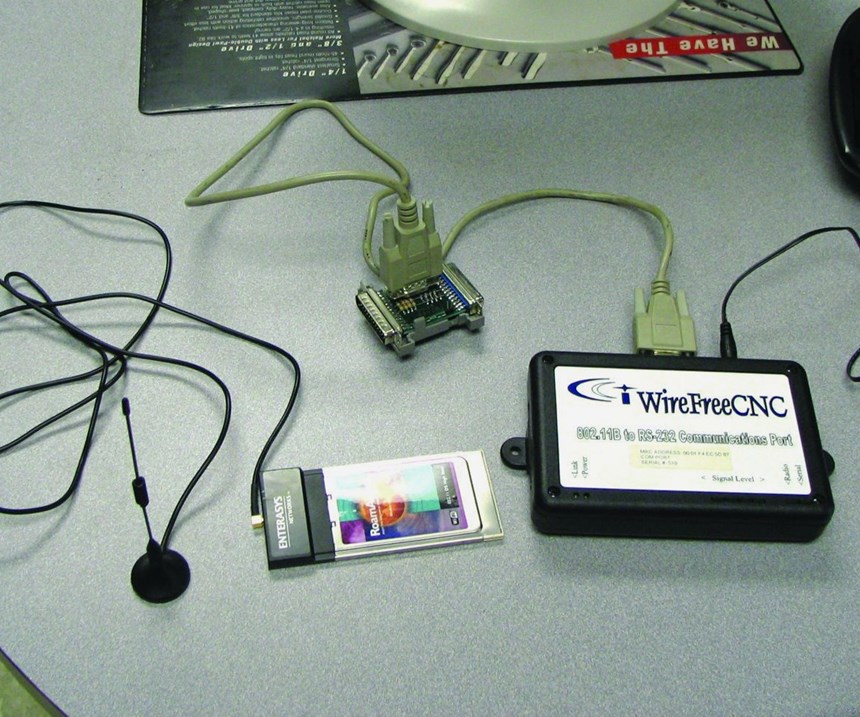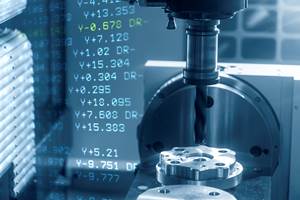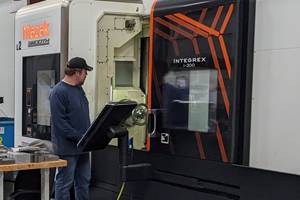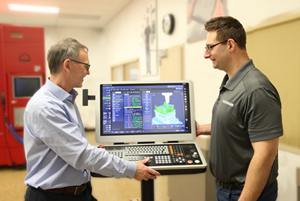MMS Looks Back: 2000s - Machine Shop Connectivity Increases
A machine shop’s experience installing Wi-Fi in 2005 is just one illustration of the rise of wireless technologies and the expectation of 24/7 connectivity. This story is part of our 90th anniversary series.
Share




Let’s get one thing out of the way first: I am a millennial. I am part of the generation that has been influenced heavily by the rise of social media, smartphones and the internet. I like to think I have paid my dues: I remember passing handwritten notes and calling friends on landlines, and the first time I accessed the internet was via a dial-up connection. However, I cannot deny the growing presence of technology over my life span. Perhaps it is fitting that I landed the assignment of writing about the 2000s, a decade of increasing connectivity in both private life and the machine shop world.
The May 2006 issue cover story, titled “No Wires, No Worries,” is about Miller Welding & Machine's experience installing a Wi-Fi network in 2005. Miller was not the first manufacturer to do so, nor was this issue the first time that Modern Machine Shop covered the use of wireless networking in machine shop environments. However, the reason for Miller’s Brookville, Pennsylvania, shop to go wireless at precisely this moment was that wired connections to its machine tools had, quite literally, backfired: A lightning strike that hit its main plant in October 2004 destroyed circuit boards inside the computer numerical control (CNC) units on its machining centers, leading to several days of downtime and thousands of dollars needed to get the machines back up and running. A wireless networking system, therefore, seemed like an appealing option.
The rise of wireless connectivity on the shop floor in the 2000s was perhaps the natural evolution of direct numeric control, which connects machine tools to a centrally located computer that stores and distributes part programs. Distributed numerical control followed, a similar setup in which a network of computers coordinates the operation of multiple machines, feeding programs into CNC memories where they can operate independently. Both networked concepts eventually came to be known as “DNC,” and it was only a matter of time before wires began to vanish from the equation.
At least for Miller, that was the case. The company had been on its way to implementing wired DNC before the lightning strike, but that event made cutting cords to machines a priority. So instead of hardwiring, the machine tools at the Brookville facility were equipped with wireless DNC devices to enable server access over Wi-Fi, by way of access points installed throughout the building.
Installation and setup were successful, but integrating Wi-Fi did not come without worry and concern: Would it be reliable? Fast enough? Secure?
Fortunately, even more than a decade ago, the answer to each of these questions was “yes.” At the time of print, Miller reported no problems with downloading numerical control (NC) programs wirelessly thanks to an error-checking protocol, and download speeds were adequate for its needs. Data encryption and other security measures kept NC programs safe from interception and Miller’s corporate network safe from attack.
We are still asking these questions, but machine shops in 2018 have even better means of answering. Reliability and speed have improved with more advanced hardware and software and faster internet connections. Shops today have their pick of network-ready equipment with built-in Wi-Fi and Bluetooth capability. The MTConnect protocol, which rolled out in the later 2000s, has made data gathering and analysis easier. Data security is perhaps the most pressing issue today; though cyberattacks on machine shops are rare, the stakes remain high. Fortunately, measures such as hardware firewalls, encryption and even cybersecurity insurance policies can provide peace of mind about using Wi-Fi on the shop floor.
The cover story of this issue is not just about the promise of Wi-Fi, however. It is what Wi-Fi represents: connectivity. For a machine shop in the mid-2000s, connectivity meant capability to send NC programs anywhere in the building from a central file server; the ability to move machines at will without rewiring the entire network; and the opportunity to connect other devices—like a portable coordinate measuring machine—to the same network wirelessly.
For shops today, connectivity extends even further. Flip through a recent issue of Modern Machine Shop and you will see ads, product listings and case studies for everything from tool-vending machines that feed data back to enterprise resource planning systems to Bluetooth-enabled probes to smartphone apps that support round-the-clock machine monitoring. For better or worse, we are more connected now than ever before.
Related Content
Tips for Designing CNC Programs That Help Operators
The way a G-code program is formatted directly affects the productivity of the CNC people who use them. Design CNC programs that make CNC setup people and operators’ jobs easier.
Read More5 Tips for Running a Profitable Aerospace Shop
Aerospace machining is a demanding and competitive sector of manufacturing, but this shop demonstrates five ways to find aerospace success.
Read MoreGenerating a Digital Twin in the CNC
New control technology captures critical data about a machining process and uses it to create a 3D graphical representation of the finished workpiece. This new type of digital twin helps relate machining results to machine performance, leading to better decisions on the shop floor.
Read MoreHow this Job Shop Grew Capacity Without Expanding Footprint
This shop relies on digital solutions to grow their manufacturing business. With this approach, W.A. Pfeiffer has achieved seamless end-to-end connectivity, shorter lead times and increased throughput.
Read MoreRead Next
Registration Now Open for the Precision Machining Technology Show (PMTS) 2025
The precision machining industry’s premier event returns to Cleveland, OH, April 1-3.
Read More5 Rules of Thumb for Buying CNC Machine Tools
Use these tips to carefully plan your machine tool purchases and to avoid regretting your decision later.
Read MoreSetting Up the Building Blocks for a Digital Factory
Woodward Inc. spent over a year developing an API to connect machines to its digital factory. Caron Engineering’s MiConnect has cut most of this process while also granting the shop greater access to machine information.
Read More
.jpg;width=70;height=70;mode=crop)




















.jpg;maxWidth=300;quality=90)











